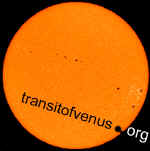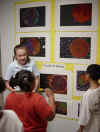Create your own stained glass window.
Bake transit of Venus cookies.
Make transit of Venus eggs.
Read a transit of Venus web page by a 6-year old girl.
Simulate a transit of Venus.
Track
Venus across the Sun.
Color
pictures from an animated show.
Enjoy
activities created by the Smithsonian Institution Libraries.
See how transits reveal new planets.
Back to basics--draw!
What is your idea?
Create your own stained glass window.
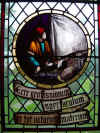
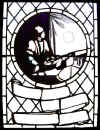
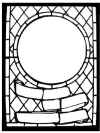
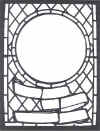
Jeremiah Horrocks was the first person to record a transit of Venus. A
stained glass window in St. Michael Church (in Hoole,
England) celebrating his 1639 achievement shows Horrocks looking at a projection of
the sun on a large sheet.
Color this window with your own words of celebration, or make your own stained glass window. For ideas of what to draw in the stained glass circle, see Things Round. For words that could fill the stained glass banner, see Quotes. The existing text declares, "Behold, a most graceful spectacle, and the realization of all my wishes." (Translation by Father Vincent Sheehy).
More stained glass windows and scenes from St. Michael Church...
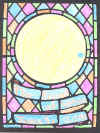 See windows.htm for examples of children's handiwork.
See windows.htm for examples of children's handiwork.
Bake transit of Venus cookies.



Prepare chocolate chip cookies, only leave out the chips. Bake the
cookies for half the required time, then take them out of the oven and add
chocolate chips quickly. Be careful--they're hot. Finish baking the
cookie. See if you can create a "Black
Drop" effect cookie.
Make transit of Venus eggs.
 egg.jpg
egg.jpg
Make sunny-side-up eggs with pepper simulating sunspots and a peppercorn
being Venus.
Read a transit of Venus web page by a 6-year old girl.
 http://www.transitofvenus.org/sarah.htm
http://www.transitofvenus.org/sarah.htm
A brief introduction to the transit of Venus, illustrated and written by a
six year old student.
Simulate a transit of Venus.

 simulate.htm
simulate.htm
Simulate a transit of Venus with a bucket or just your computer monitor.
Track Venus across the sun.
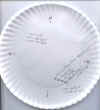 http://analyzer.depaul.edu/paperplate/Transit of Venus/activity.htm
http://analyzer.depaul.edu/paperplate/Transit of Venus/activity.htm
Watch the transit safely with an adult and record what you see with the Transit
of Venus Activity.
Color pictures from an animated show.
 http://sunearth.gsfc.nasa.gov/sunearthday/2004/vt_kinder_ownstar.htm
http://sunearth.gsfc.nasa.gov/sunearthday/2004/vt_kinder_ownstar.htm
Watch Our Very Own Star: The Sun, an animated story for children,
accompanied by coloring sheets; in English and Spanish.
Enjoy activities created by the Smithsonian Institution Libraries.
 http://www.sil.si.edu/exhibitions/chasing-venus/teachers/
http://www.sil.si.edu/exhibitions/chasing-venus/teachers/
Chasing Venus Teacher Resources from Smithsonian Institution Libraries
offers eighteen activities, including the following::
- Two Views of the Universe (K-6; Science and Geography) Students build two views (Aristotle's and Copernicus') of the universe and describe the differences.
- Collage of Geometric Shapes (K-5; Mathematics, Art) Students identify different geometric shapes and use the differences in the building of collages.
- Shadow Games (K-5; Science, Measurement) Students discover how light source, object, and distance affect the shadow's shape.
See how transits reveal new planets.
 http://planetquest.jpl.nasa.gov/
http://planetquest.jpl.nasa.gov/
Planet Quest offers much material about the search for extra-solar planets.
Click "Four Ways to Find a Planet" on the scrolling filmstrip to view
a narrated animation that shows planet detection methods, including the use of
transits.
Back to basics--draw!
 club.htm
club.htm
Draw your interpretation of the transit of Venus, as done by the Boys &
Girls Club members in St. Joseph County, Indiana.
What is your idea?
Got a suggestion or an idea for a Kid Activity? Please send it to Chuck Bueter.
Excerpt from jars-scopes.doc:
Considering the average life span today, and anticipating longer life spans in the future, we have the chance of setting someone on their way to seeing more than two transits in a lifetime. If a youth destined for longevity were to glimpse her first transit in 2004, then she may have a chance at seeing transit numbers 4 and 5 in the 22nd century. But it can only happen if we embrace youth and encourage them to take a safe peek.
